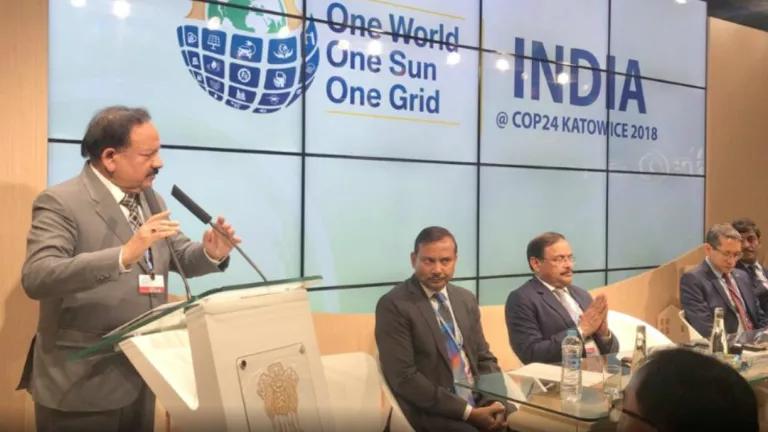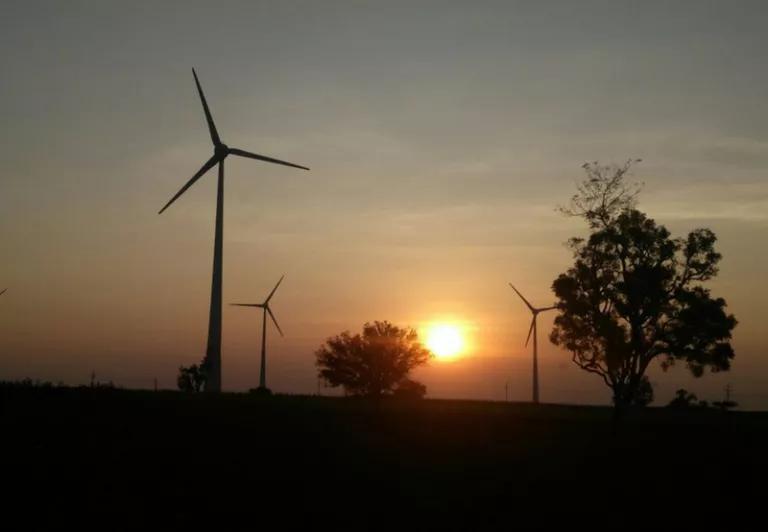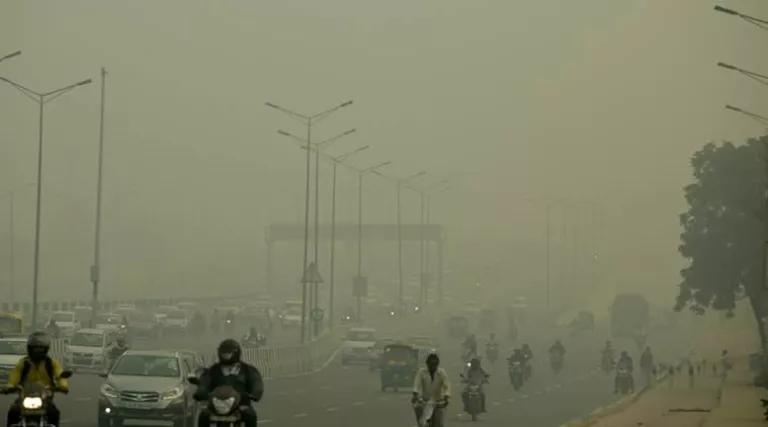
India Green News: India Reiterates Its Commitment to Paris Agreement; Renewable capacity addition may surge by 50% in 2019; National Clean Air Program to combat pollution launched, to be rolled out in 102 cities
India Green News is a selection of news highlights about environmental and energy issues in India.
January 1 – 16, 2019
CLIMATE CHANGE
India Reiterates Its Commitment to Paris Agreement
The Union Cabinet on Wednesday gave its ex post facto approval to India's negotiating stand at COP24 where it reiterated its commitment to Paris Agreement but added that the actions of developing countries must be supported by developed nations.
The Indian delegation to the 24th Conference of Parties (COP24) to the United Nations Framework Convention on Climate Change (UNFCCC) held at Katowice in Poland between December 2 and 15 was led by Environment Minister Harsh Vardhan.
"The key focus of the meeting was to finalize guidelines for implementation of the Paris Agreement in the post-2020 period. India's approach was guided by principles and provisions of UNFCCC and Paris Agreement particularly the principles of Equity and Common But Differentiated Responsibilities and Respective Capability (CBPR-RC)," an official statement said…
(The Weather Channel – January 2, 2019)
India’s annual carbon footprint increased but is well on track to meet its global climate pledges
India’s annual carbon footprints increased in 2014 as compared to 2010, but the country is well on track to meet its global climate action pledges - both its Copenhagen and Paris commitments where it has vowed to reduce emission intensity of its GDP (emission per unit of GDP) by 2020 and 2030, respectively.
The message is clearly reflected in the country’s second Biennial Update Report (BUR-II) which was made public by the UN climate body on Friday. India submitted this Report early this week.
The Report, giving details of India’s national greenhouse gas (GHG) inventory, shows that the country has already reduced its emission intensity by 21% between 2005-2014 and it would certainly meet its Paris pledges under enhanced global support in terms of finance and technology as “climate change is a global action problem”…
(The Times of India – January 6, 2019)
ENERGY

Renewable capacity addition may surge by 50% in 2019
After a year of relative lull, renewable energy will be back on track in 2019 with new plants being set up and the introduction of the much-anticipated policy on battery storage. This will also be the year when floating solar projects will add significant capacity to the country’s generation scene, according to the India RE 2019 Outlook published by renewable energy consultancy Bridge to India.
Total renewable energy capacity addition in 2019 will be 15,860 megawatts (MW), up 50% compared to 2018, when there was a lack of clarity on goods and services tax (GST), safeguard duty and BIS standards, besides slow construction of large parks and poor grid connectivity.
“Dictated purely by tender timetables, capacity addition should jump from 10,560MW last year to 15,860MW in 2019,” the report, shared exclusively with Mint, estimates. “Most of the uplift will come from utility scale solar although rooftop solar is also expected to register another year of fantastic growth…”
(LiveMint – January 9, 2019)
India’s SECI tenders 7.5GW of solar in Ladakh
Solar Energy Corporation of India (SECI) has issued a request for selection (RfS) for 7.5GW of grid-connected solar PV projects, including implementation of power transmission and evacuation infrastructure, in the Leh and Kargil districts of Jammu & Kashmir state.
This includes three packages of 2.5GW each in the Ladakh region. Package (A) has been tentatively located in Zanskar sub-division and Tai Suru block of Kargil district, and Packages (B) and (C) are in the Hanley Khaldo area of Nyoma sub-division in Leh district. Bidders are eligible to bid for either one or all of the packages.
This is part of the central government's scheme to set up 23GW of solar across the state. The scale of this plan and issues with developers also having to set up transmission infrastructure up to the delivery point were covered in a recent blog on PV Tech, including an engineer's viewpoint highlighting potential safety and skilled manpower issues to name a few…
(PV Tech – January 2, 2019)
India Sees Over 9.5 GW of Wind Auctions Since Inception of Reverse Bidding in 2017
Since the inception of reverse bidding in India’s wind sector back in February 2017, approximately 10 GW of wind power projects have been auctioned in the country.
The Minister for Power, Government of India, R. K. Singh stated in the Lok Sabha, “The wind power projects in the country are installed on the basis of commercial viability through tariff based competitive bidding process. As on date, the bids for setting up of wind power projects of aggregate 8.4 GW capacity have been finalized through the Solar Energy Corporation of India (SECI) and the National Thermal Power Corporation (NTPC). Bids of 500 MW each have been finalized by the states of Tamil Nadu, Gujarat and Maharashtra.”
Singh also informed the Lok Sabha that the government has set a target of installing 60 GW of wind power capacity by 2022, against which 35 GW capacity has already been installed…
(Mercom India – January 1, 2019)
BEE, CPWD ink pact for energy efficient buildings
Bureau of Energy Efficiency (BEE) and Central Public Works Department (CPWD) Thursday inked a pact to make 150 buildings energy efficient, which would save 260 million units, resulting in savings of Rs 100 crore per annum.
“In the first stage, approximately 150 buildings will be taken under star rating scheme and to promote energy efficiency in the CPWD managed buildings. It is anticipated that this initiative will result in energy saving of more than 260 million units in the first stage (with operational saving of Rs 100 crore per annum),” a power ministry statement said.
The star-rating scheme for buildings is based on the actual performance of a building in terms of its specific energy usage in kwh/sqm/year. The scheme rates office buildings on a scale of 1-5, with 5-star labeled buildings being the most efficient…
(The Hindu Business Line – January 10, 2019)
ENVIRONMENTAL HEALTH AND AIR POLLUTION

National Clean Air Program to combat pollution launched, to be rolled out in 102 cities
Calling it a “war against pollution”, Union Environment Minister Harsh Vardhan on Thursday launched the National Clean Air Program (NCAP) to combat air pollution in a comprehensive and time-bound manner. The program’s objective is to put in place mitigation actions for prevention, control and abatement of air pollution.
“You all know pollution is a very serious problem, not just for Delhi, and the rest of the country but the whole world,” Vardhan said after launching the program. Initially, the NCAP will be rolled out across 102 cities where particulate matter has been consistently high over five years.
The program aims to reduce the concentration of PM2.5 (fine, respirable pollution particles) and PM10 (coarse pollution particles) by 20-30 per cent over the 2017 annual average levels by 2014…
(The Indian Express – January 10, 2019)
Gensol Mobility has launched India’s first ever 100 percent smart electric fleet of taxis namely Blu-Smart in Delhi NCR. The company has said in a press statement that it has invested over Rs 50 crore as capital expenditure and is currently setting up charging infrastructure of 65 stations, with each offering up to 20 charging points across the NCR. With this, the company aims to offer an assured charging point within 5 km radius. Blu-Smart is a shared travel solution and will be surge-price free according to the company. In the first phase, 70 Blu-Smart cabs will be available in Noida, Greater Noida, Gurugram and Aerocity. The fleet will be revamped to 400 cars by end of March 2019 to offer last mile transportation for intra and inter-city trips. Gensol Mobility has joined hands with Mahindra & Mahindra to ply its e-Verito electric sedan across specific routes in the national capital region such as Greater Noida, Gurugram, Manesar, Sonepat amongst others…
(Financial Express – January 14, 2019)
Leading By Example! Finance Ministry Deploys 15 Mahindra e-Verito Electric Cars In Its Fleet
Remember how two of India’s biggest automobile manufacturers had collaborated with Energy Efficiency Services Limited (EESL) to provide electric cars to the Indian ministries? The deal has been progressing as per plans as EESL has now signed an agreement with the Department of Economic Affairs, Ministry of Finance, deploying 15 of these EVs for their officers.
In the latest push to EV adoption by the government bodies, 15 Mahindra e-Veritos have been appointed to serve the officers of the Finance Ministry. Thanks to 15 of these vehicles, the Department of Economic Affairs is expected to save 36,000 liters of fuel every year, which will correspondingly eliminate 440 tons of CO2 emissions annually…
(India Times – January 10, 2019)
Compiled by Laasya Bhagavatula
Note: The linked articles and excerpts in this post are provided for informational purposes only and do not necessarily reflect the views or positions of the India Initiative or of the Natural Resources Defense Council.
